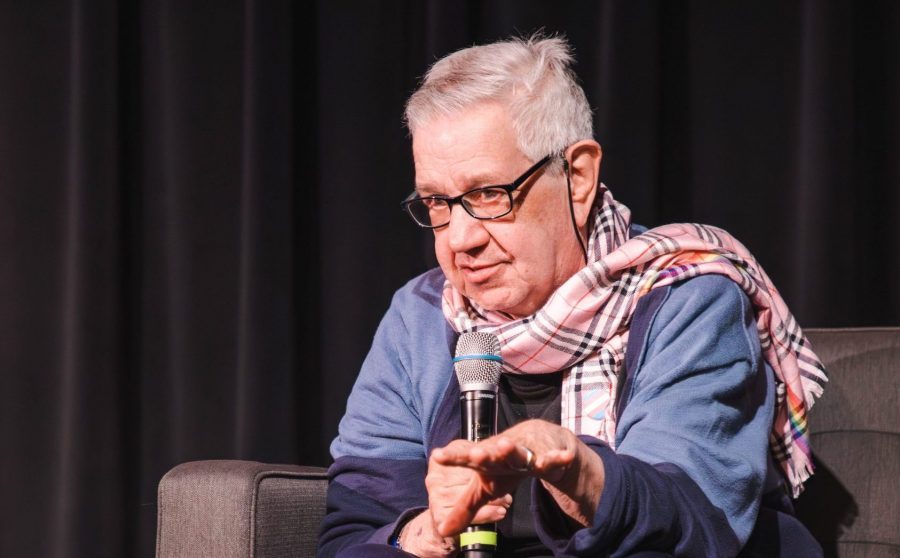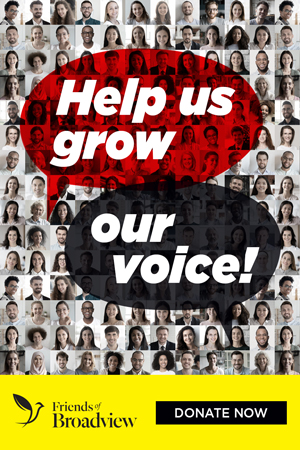On June 28, 1969, police raided Stonewall Inn in New York City, cracking down on its LGBTQ+ clientele. Unlike previous raids, however, this time the patrons fought back. Thus the Stonewall Riots began, changing the trajectory of LGBTQ+ activism forever. Eventually activist groups demanded the right to live openly regardless of sexual orientation, helping propel the progression of gay rights.
Although LGBTQ+ rights have improved a great deal, the fight is far from over. Since 2022, over 36 states in the U.S. have introduced more than 300 anti-LGBTQ+ laws or policies. These rollbacks have restricted access to healthcare, parental rights and more, violating the rights of millions of people.
Martin Boyce participated in the Stonewall Riots when he was only 21, and is still a prominent activist to this day, giving talks around North America. Most recently, he toured around Canada with the Day of Pink organization, recounting his experience at Stonewall and championing LGBTQ+ rights.
He spoke on the phone with Alexandra Lee.
Alexandra Lee: What was it like to be at the Stonewall Inn during the now-iconic riots?
Martin Boyce: It was frightening but it was mitigated by adrenaline. I mean, there was no other way out. It was do or die at that moment. They had attacked a bar, the only bar we had in the middle of the city, in the middle of the village that wasn’t on the docks or the warehouse we had.
There were so many casualties and at that night. It seemed like everybody remembered somebody that had suffered at the hands of what we used to call Lily Law, the [undercover] police, and the crowd couldn’t take it anymore. Eyes were pleading with each other what to do, but at the same time to do something. And we did something.
Interested in more stories like this? Subscribe to Broadview’s weekly newsletter.
AL: How do you think the legacy of Stonewall has affected LGBTQ+ culture and activism today?
MB: Well, Stonewall has become a verb, which of course is an action word and it’s propelling. It also gave us a geography. Stonewall is a landmark to what can be achieved when you really want to, when you’re really desperate, when you’re really pushed in the corner. So Stonewall is a monument, a landmark to our activism. If we could initiate that activism, we did. And it’s continued now for 53 years.
Activism is alive and well today but it’s also a reaction. I think the offense is on the hands of the anti-gay people and it’s really a matter of reaction. I think we have to see what they’re going to do before we can do anything to counter them.
AL: What are some lessons you think we can learn from Stonewall and other similar protests?
MB: Well, there’s lessons we learned, there’s also lessons [the authorities] have to learn that patience is something that can’t last forever. Patience is something that can hit a wall, a stone wall.
And it’s what happened with us. The lesson is always in America that nobody’s gonna give you your freedom. You have to fight for it and if you fight for it, you deserve it. That’s the way America really is, they’ll push you and pain you until you react. And if you don’t react, they’ll shame you into oblivion.
We learned action and we learned to like each other. We learned intra-tolerance — first tolerance of each other and then asking the world to be tolerant of ourselves and others. I think it was really important because we didn’t like each other, the different gay groups and we blamed each other for the troubles. At Stonewall, [we stopped] blaming each other and blamed the real perpetrators — the Lily Law.
More on Broadview:
- Norwich United church opens doors to everyone amid Pride flag ban on town property
- “It was the scariest thing I’d ever done … and also the best”: celebrating later-in-life transition stories
- David Fearon, who challenged a homophobic translation of a Bible passage, has died at 84
AL: What do you see as the most important fight for queer activists right now?
MB: The fight over trans people and drag queens. They’re on the firing line, they were on the firing lines back at the time of Stonewall.
The most important thing is that we stick together. And I think after AIDS, I think gays themselves have realized that we really need each other. All gays, trans people, and drag queens, and the regular gays are like the wings of the same bird. We’re not going to reach real freedom on one wing. We gotta do this together.
And I think that I can really be proud, actually, of this generation for not holding back, for standing up. And it’s their time, their turn. I tell them to be fearful and they should be fearful, but not to despair because we’re on the right side of history. And we’re also on the right side of the heritage of Western individuality. And gays are carrying that torch, which is a very, very important torch to carry.
I mean, the American Black essayist W. E. B. Dubois said in 1945 that the Nazis were defeated, but not their ideas. And we are now dealing with these ideas and that too must be defeated. And I think we’ll manage with our allies and with all people who have a heart. We’re going to win this war, not just this battle, all over the globe.
***
This article has been edited for length and clarity.
Alexandra Lee is an intern at Broadview.
We hope you found this Broadview article engaging.
Our team is working hard to bring you more independent, award-winning journalism. But Broadview is a nonprofit and these are tough times for magazines. Please consider supporting our work. There are a number of ways to do so:
- Subscribe to our magazine and you’ll receive intelligent, timely stories and perspectives delivered to your home 8 times a year.
- Donate to our Friends Fund.
- Give the gift of Broadview to someone special in your life and make a difference!
Thank you for being such wonderful readers.
Jocelyn Bell
Editor/Publisher


Comments
Gary says:
If one were to read history.com or Wikipedia, we see that the events that took place on the first day of the riots were not exactly peaceful on the side of the LGTBQ. I find it astonishing that the Stonewall bar was run illegally by the Mafia, and that the "so called" peaceful protesters wanted to burn down the bar with police, innocent protesters and media.
I understand that people want a place to be themselves, but to glorify adrenaline rush to make a point isn't exactly glamorous, nor something that should be celebrated either. I'm surprised that we don't celebrate the Watt's riots for the month of August, same idea.